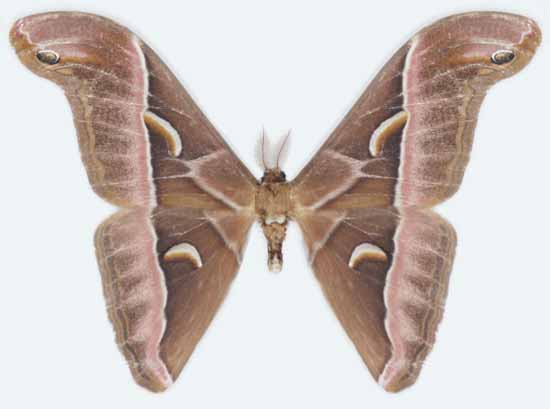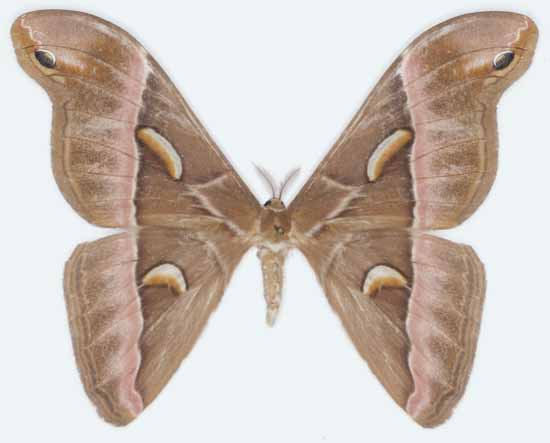Samia naumanni
Samia naumanni
U. Paukstadt, Peigler, & L. H. Paukstadt, 1998

Samia naumanni male
| TAXONOMY:
Superfamily: Bombycoidea, Latreille, 1802
Family: Saturniidae, Boisduval, [1837] 1834
Subfamily: Saturniinae, Boisduval, [1837] 1834
Tribe: Attacini, Blanchard, 1840
Genus: Samia, Hubner, 1819
| |
MIDI MUSIC
"Asian Spring Blossoms"
ON.OFF
<bgsound src="AsianSpringBlossoms.mid" LOOP=FOREVER>
|
DISTRIBUTION:
The Samia naumanni
(forewing length: males: 73-84mm; females: 64mm) moth flies in
Peleng: Banggai Archipelago and Sulawesi, Sula Islands and
Province Central Moluccas.
Note the strong bend on the inner third
of the forewing crescent. This moth is very similar to S. naessigi.
FLIGHT TIMES AND PREFERRED FOOD PLANTS:
The species
probably broods continuously but there seem to be
seasonal peaks.
Specimens have been taken in February, July,
August, September, October.
Larvae are probably polyphagous on native trees,
but natural hosts remain unknown.
ECLOSION, SCENTING AND MATING:
The female begins
scenting after dark by projecting a scent gland from the posterior
tip of her abdomen. Males fly into the breeze, probably from 2:30 am
until dawn, and hone in on the pheromone plume via their highly
developed and sensitive antennae.

Samia naumanni female
EGGS, LARVAE, COCOONS AND PUPAE:
Eggs are probably
deposited on host foliage with incubation probably
requiring eight to ten days.
Larval Food Plants
It is hoped that this alphabetical listing followed by the common
name of the foodplant will prove useful. The list is not exhaustive.
Experimenting with closely related foodplants is worthwhile.
Use your browser "Back" button to return to the previous page.
Return to Samia genus
Goto Asian Pacific Saturniidae Directory.
Goto Main Saturniidae Index

